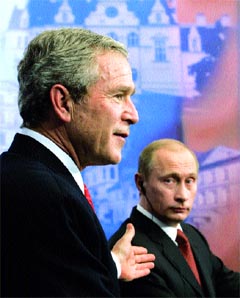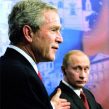
RUSSIAN COMMENTATORS: PUTIN WON ON POINTS
Publication: Eurasia Daily Monitor Volume: 2 Issue: 39
By:

As expected, the issue of Russian democracy — or, rather, its shrinkage — figured in President George W. Bush’s summit with President Vladimir Putin in Bratislava, Slovakia, at least in the joint press conference they held following their two-and-a-half hour private meeting. However, the American president’s expressions of concern about the Kremlin’s ongoing centralization of power made up only about a quarter of his opening remarks, and even these critical comments were largely oblique and, judging by their tone, made more in sorrow than anger.
“It’s very important that we establish not only a working relationship, but that we understand that in the 21st century strong countries are built by developing strong democracies,” Bush said in his opening remarks. “And so we talked about democracy. Democracies always reflect a country’s customs and culture, and I know that. But democracies have certain things in common: They have a rule of law and protection of minorities, a free press, and a viable political opposition. Russia has made tremendous progress over the last 15 years. It’s an amazing transformation of the nation. And I applaud President Putin for dealing with a country that is in transformation. And it’s been hard work. I was able to share my concerns about Russia’s commitment in fulfilling these universal principles. I did so in a constructive and friendly way. I reaffirmed my belief that it is democracy and freedom that bring true security and prosperity in every land. We may not always agree with each other, and we haven’t over the last four years — that’s for certain — but we found a lot agreement, a lot of common ground, and the world is better for it” (Whitehouse.gov, February 24).
The U.S. president’s comments about democracy and human rights in Russia were noticeably milder than those in his speech in Brussels on February 21. “[F]or Russia to make progress as a European nation, the Russian government must renew a commitment to democracy and the rule of law,” Bush said in the Brussels speech. “We recognize that reform will not happen overnight. We must always remind Russia, however, that our alliance stands for a free press, a vital opposition, the sharing of power, and the rule of law — and the United States and all European countries should place democratic reform at the heart of their dialogue with Russia” (Whitehouse.gov, February 21).
In his Bratislava speech, Putin said that Russia would never return to the past — something he has said before — but added his now familiar caveat: that “the principles of democracy should be adequate to the current status of the development of Russia, to our history and our traditions.” Bush indicated that he accepted this explanation, answering one reporter’s question by saying: “I think the most important statement that you heard, and I heard, was the President’s statement, when he declared his absolute support for democracy in Russia, and they’re not turning back. To me, that is the most important statement of my private meeting, and it’s the most important statement of this public press conference.” Bush added: “And I can tell you what it’s like dealing with the man over the last four years: When he tells you something, he means it.”
In addition, while members of the American press corps asked both presidents tough questions about the human rights situation in Russia, questions from several members of the Russian press corps actually forced President Bush into the position of having to deny that the United States has retreated from democracy. Andrei Kolesnikov of Kommersant referred in a question to “the great powers” that the American security services have assumed, “due to which the private lives of citizens are now being monitored by the state,” and added: “This could be explained away by the consequences of September 11th, but this has nothing to do with democratic values.” Bush responded by saying that he lives in a “transparent country” in which the government is accountable and must behave constitutionally.
At this point, Putin actually came to Bush’s defense, stating: “I would like to support my American counterpart. I’m absolutely confident that democracy is not anarchy. It is not the possibility to do anything you want. It is not the possibility for anyone to rob your own people. Democracy is, among other things, and first and foremost, the possibility to democratically make democratic laws and the capability of the state to enforce those laws.” The American president was also put on the defensive when Interfax correspondent Alexei Meshkov asked Putin why he does not raise the issue of “violations of the rights of journalists in the United States, about the fact that some journalists have been fired” (Whitehouse.gov, February 24).
Several Russian observers felt that Putin got the better of Bush in the joint press conference. “Were it proper to ask who carried the day at the summit in Bratislava — Russia or the U.S. — I would risk calling the Russian president the winner on points,” Arkady Dubnov wrote from Bratislava for the February 25 edition of Vremya novosti. “In spite of George Bush’s repeated statements that he would directly put the issue of the rejection of democracy in Russia before Vladimir Putin, the press heard nothing of the sort from the American president yesterday. On the contrary, Bush radiated satisfaction and even pride from having received from ‘friend Vladimir’ assurances that Russia now as before is devoted to democracy and will not betray the choice it made 14 years ago.”
Other observers had a similar take. “The subject of the underdevelopment of Russian democracy was raised a huge number of times in the days preceding the summit,” Ilya Baranov wrote for Gazeta.ru on February 24. “Many American and European politicians insistently advised the American president to draw attention to that subject during the course of his conversation with Putin. At the end of the day, the accents were maximally softened and what is more the Russian president returned the favor.”
For his part, State Duma Foreign Affairs Committee Konstantin Kosachev said that the summit “exceeded the most optimistic expectations.” He added that “discussions of the subject of democracy did not occupy the central place in the two presidents’ talks, and George Bush’s comment that the field of our disagreements is considerably narrower than the field of [our] coinciding interests can be considered crucial” (Interfax, February 24).
Despite this upbeat appraisal of the summit by an important Kremlin ally, it is worth noting that the Kremlin’s official website posted a transcript of statements made at the presidents’ joint press conference in Bratislava that includes only questions to and answers by Putin (Kremlin.ru, February 24).




